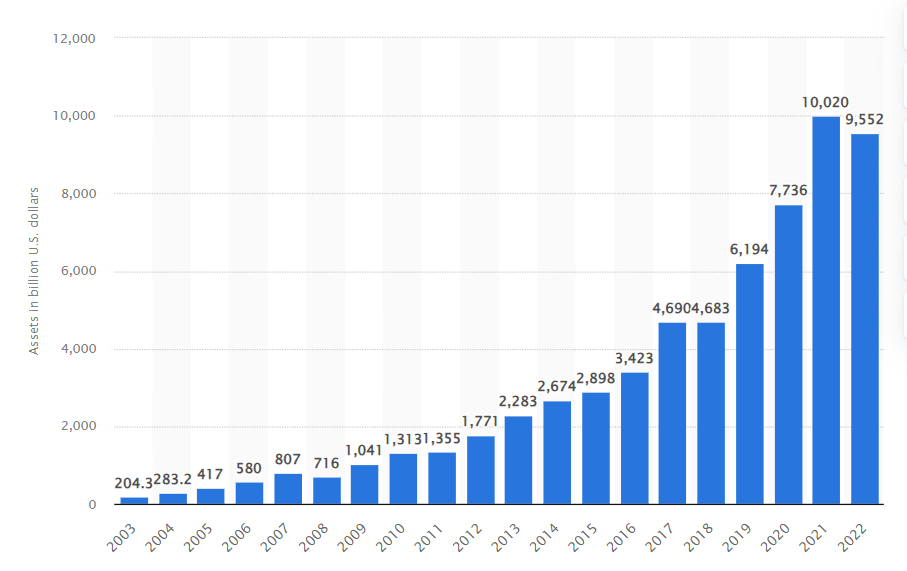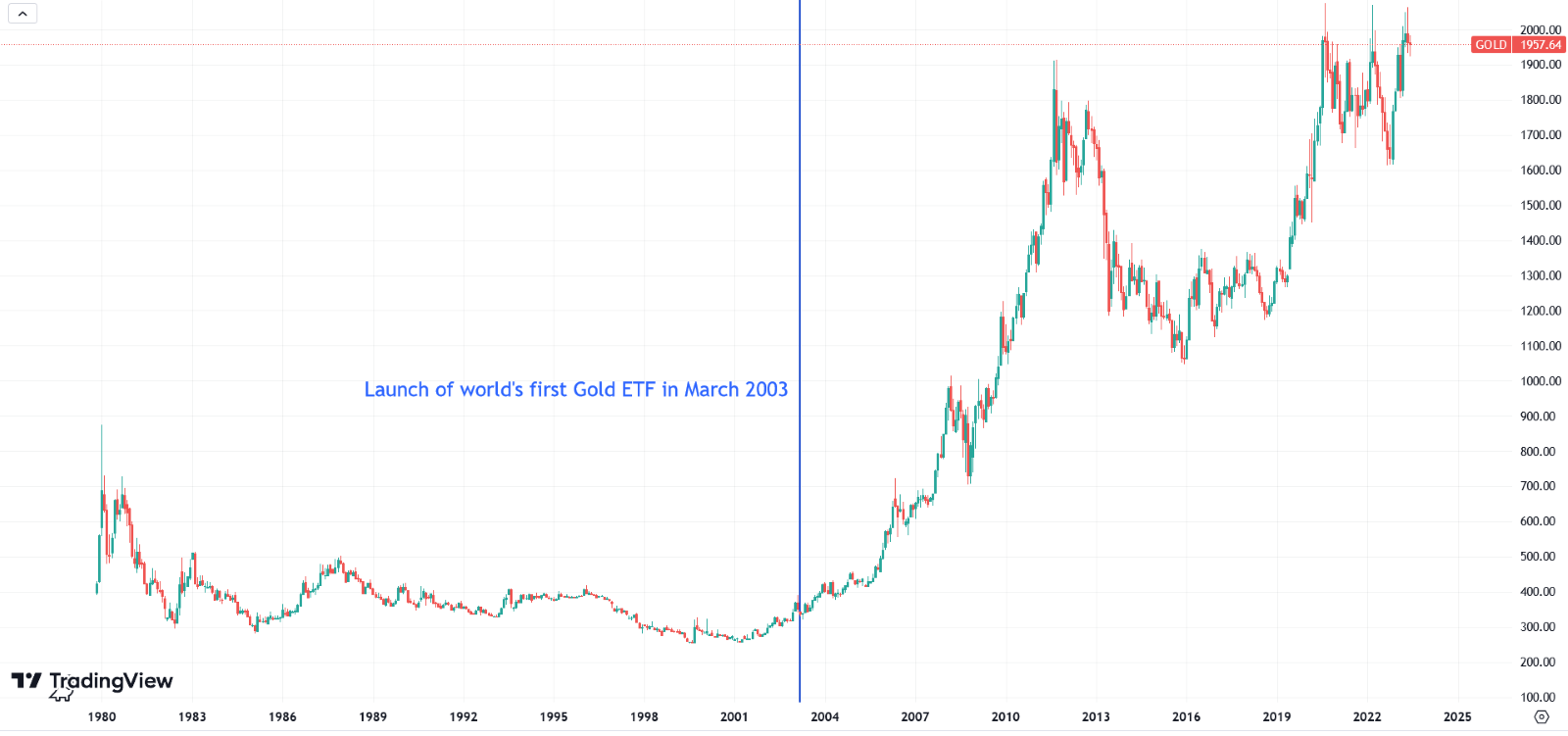Overview
Bitcoin Spot ETF has been the hot topic over the past weeks and has largely contributed to the recent Bitcoin rally from $25,000 to $30,000. Even the possibility of a spot ETF approval has changed the mood of the community with many in crypto social media already speculating about BTC reaching $40,000 and beyond in the coming months. In this article, we will examine what a Spot ETF could mean for Bitcoin and the broader crypto ecosystem and explore its advantages and disadvantages.
Understanding ETFs
ETF, short for Exchange Traded Funds, refers to an investment product that tracks a particular underlying asset. ETFs operate similarly to mutual funds, but with one key difference: they can be freely traded on the open market. They offer investors a lower-cost alternative to mutual funds and provide greater flexibility to enter or exit investment positions since they can be bought and sold on exchanges. These advantages have fueled the rapid growth of the ETF market. In 2003, the total assets under management were around $200 billion, but by 2022, this figure has surged over 45 times to $9.5 trillion.

Amidst all the recent buzz surrounding the Bitcoin ETF, many are unaware that Bitcoin ETFs have been available for some time. The first Bitcoin ETF, called ProShares Bitcoin Strategy ETF (ticker symbol 'BITO'), was launched in October 2021 by ProShares. So, what makes the recent announcement more exciting? Bitcoin Futures backed the previous Bitcoin ETFs, while the current ETF tends to be backed by actual Bitcoins.
Difference Between Spot and Futures ETFs
A spot ETF is backed by the real asset it represents. If a company wants to sell a 1 BTC Spot ETF, it must acquire 1 BTC to support that product. On the other hand, Futures ETFs are backed by Bitcoin Futures, which are derivatives of Bitcoin. Therefore, a Futures ETF can be considered a derivative of a derivative. Since Bitcoin does not directly back Bitcoin Futures, any investment made in Futures ETFs does not directly impact the underlying asset's price. In contrast, a Spot ETF contributes to increased demand for Bitcoin in the crypto spot market with every dollar invested in the fund.
Importance of ETFs
A spot ETF represents a major milestone in the growth of an asset class. It demonstrates that the institution launching the ETF believes in the viability of the underlying asset. This seal of approval from major traditional financial (TradFi) institutions could help change the negative perception of cryptocurrencies among the general public. Similarly, as more ETFs are launched, more investment will begin to flow into the crypto sector because many institutional investors are more open to investing in a TradFi product like an ETF rather than directly buying cryptocurrencies, particularly in countries with unclear regulations regarding crypto investments.

We have seen with other asset classes where the availability of ETF helps increase the underlying asset's price. The chart below shows the price of gold over the past 43 years, with the blue line representing the launch of the world’s first Gold ETF in 2003. The differences between the pre and post-ETF years are obvious. While ETFs alone cannot be solely credited for the entire price movement, it is highly likely that the availability of ETFs as an easily accessible investment option played a role in making gold the primary hedge for many investors.
Crypto ETF Regulations in the U.S.
In the US, the nature of crypto investment remains unclear as the Securities and Exchange Commission has declared several cryptocurrencies as securities while the CFTC wants to list several of them as commodities. Such regulatory uncertainty will force most TradFi financial institutions to avoid crypto investments. However, a spot ETF is a product with no regulatory ambiguity and will allow all those who want to invest in crypto but are afraid of any regulatory backlash.
Regarding Bitcoin Spot ETF, the SEC has allowed numerous Bitcoin Futures ETFs but has consistently rejected spot ETF applications. The main reason for rejecting spot ETFs is the volatility and potential manipulation in the Bitcoin market. However, this reasoning becomes questionable when considering the approval of Bitcoin Futures ETFs. Since Bitcoin Futures depend on spot prices, they are also affected by the same volatility and "manipulation." Nonetheless, the SEC has maintained this argument for several years. With larger players like BlackRock entering the space, it is hoped that the SEC might make a different decision this time.
Impact of Spot ETF Approval
If the SEC approves the Spot ETF, it could significantly impact the demand for Bitcoin. As depicted in the previous chart, asset management firms manage trillions of dollars. Even a small allocation of these funds to a Bitcoin ETF could result in billions of dollars flowing into the ecosystem. Additionally, considering the decreasing availability of Bitcoin and Ether for trade, we may witness a substantial price increase once the ETFs gain popularity.
Asset Managers | Managed AUMs |
Blackrock | $9.1 T |
Fidelity Management | $3.9T |
Invesco | $1.5T |
WisdomTree | $94B |
VanEck | $47B |
Valkyrie | $1B |
The combined assets under management for these companies are almost $16 trillion. Even if the cryptocurrency market captures a small percentage of this vast market, we can expect billions of dollars to flow into the ecosystem. This, coupled with the diminishing supply of Bitcoin and Ether available for trading, suggests the potential for a sharp price increase once the ETFs gain popularity.
In addition to the influx of capital, the legitimization of our industry holds significant importance. The crypto ecosystem has long been criticized with derogatory terms such as 'vaporware,' 'rat poison,' and 'new tulip mania' by individuals in the TradFi space. However, the launch of ETFs by leading TradFi names will clearly indicate to the rest of the world that crypto is here to stay and the long-expected death of crypto is not happening.
Potential Downside of Crypto ETFs
Despite all the advantages, crypto ETFs are not without some downsides. One notable threat is the possibility that giant ETFs could gradually amass enough crypto holdings to exert control over certain networks, particularly smaller tokens that grant voting rights to holders. The original intent of crypto was to replace the TradFi institutions and not become a part of it, but these ETFs could become the first step in TradFi gaining at least some control over the crypto ecosystem.
Conclusion
Like any new product, ETFs offer both advantages and disadvantages. Considering the current state of crypto, it is reasonable to assume that the emergence of ETFs could benefit the ecosystem and instill much-needed confidence in both the wider world and the users and builders of Web3 that this ecosystem is slowly gaining acceptance and adoption. It will be interesting to witness the development of ETFs in the coming years and how many coins and tokens eventually have their ETFs. For now, we can confidently say that the day the first Bitcoin Spot ETF is approved will be a momentous day in crypto history.
Discover SynFutures' crypto derivatives products: www.synfutures.com/.
Disclaimer: SynFutures Academy does not guarantee the reliability of the site content and shall not be held liable for any errors, omissions, or inaccuracies. The opinions and views expressed in any SynFutures Academy article are solely those of the author(s) and do not reflect the opinions of SynFutures. The SynFutures Academy articles are for educational purposes or information only. SynFutures Academy has no relationship to the projects mentioned in the articles, and there is no endorsement for these projects. The information provided on the site does not constitute an endorsement of any of the products and services discussed or investment, financial, or trading advice. A qualified professional should be consulted before making financial decisions.


